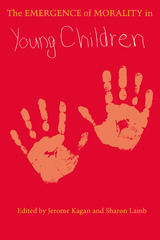
"This is a welcome and immensely provocative book. For those of us who favor ethical theorizing done in close proximity to psychology and anthropology, it provides new and illuminating theory and research relevant to perennial debates about the origins of moral sense, its psychological organization, and the objectivity and unity of the moral."—Owen Flanagan, Ethics
The contributors are Augusto Blasi, Lawrence Blum, Judy Dunn, M. Ann Easterbrooks, Carolyn Pope Edwards, Robert Emde, Carol Gilligan, Charles C. Helwig, William F. Johnson, Jerome Kagan, Melanie Killen, Sharon Lamb, Manamohan Mahapatra, Joan G. Miller, Edward Mueller, Richard A. Shweder, Catherine Snow, Elliot Turiel, and Grant Wiggins.
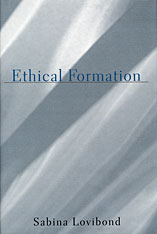
Sabina Lovibond invites her readers to see how the "practical reason view of ethics" can survive challenges from within philosophy and from the antirationalist postmodern critique of reason.
She elaborates and defends a modern practical-reason view of ethics by focusing on virtue or ideal states of character that involve sensitivity to the objective reasons circumstances bring into play. At the heart of her argument is the Aristotelian idea of the formation of character through upbringing; these ancient ideas can be made contemporary if one understands them in a naturalized way. She then explores the implications that arise from the naturalization of the classical view, weaving into her theory ideas of Jacques Derrida and J. L. Austin. The book also discusses two modes of resistance to an existing ethical culture--one committed to the critical employment of shared norms of rationality, the other aspiring to a more radical attitude, grounded in hostility to the "universal." Lovibond tries to determine what may be correct in this second, admittedly paradoxical, tendency.
This is a timely and valuable effort to connect the most advanced forms of thinking in the analytic tradition and in the Continental tradition, and to extend our understanding of the intimacies and resistances between these two prominent strands of contemporary philosophy.
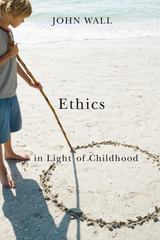
Childhood faces humanity with its own deepest and most perplexing questions. An ethics that truly includes the world’s childhoods would transcend pre-modern traditional communities and modern rational autonomy with a postmodern aim of growing responsibility. It would understand human relations in a poetic rather than universalistic sense as openly and interdependently creative. As a consequence, it would produce new understandings of moral being, time, and otherness, as well as of religion, rights, narrative, families, obligation, and power.
Ethics in Light of Childhood fundamentally reimagines ethical thought and practice in light of the experiences of the third of humanity who are children. Much like humanism, feminism, womanism, and environmentalism, Wall argues, a new childism is required that transforms moral thinking, relations, and societies in fundamental ways. Wall explores childhood’s varied impacts on ethical thinking throughout history, advances the emerging interdisciplinary field of childhood studies, and reexamines basic assumptions in contemporary moral theory and practice.
In the process, he does not just apply ethics to childhood but applies childhood to ethics—in order to imagine a more expansive humanity.
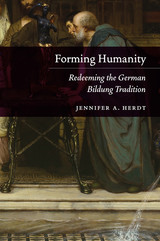
Kant’s proclamation of humankind’s emergence from “self-incurred immaturity” left his contemporaries with a puzzle: What models should we use to sculpt ourselves if we no longer look to divine grace or received authorities? Deftly uncovering the roots of this question in Rhineland mysticism, Pietist introspection, and the rise of the bildungsroman, Jennifer A. Herdt reveals bildung, or ethical formation, as the key to post-Kantian thought. This was no simple process of secularization, in which human beings took responsibility for something they had earlier left in the hands of God. Rather, theorists of bildung, from Herder through Goethe to Hegel, championed human agency in self-determination while working out the social and political implications of our creation in the image of God. While bildung was invoked to justify racism and colonialism by stigmatizing those deemed resistant to self-cultivation, it also nourished ideals of dialogical encounter and mutual recognition. Herdt reveals how the project of forming humanity lives on in our ongoing efforts to grapple with this complicated legacy.

Most of us are content to see ourselves as ordinary people—unique in ways, talented in others, but still among the ranks of ordinary mortals. Andrew Flescher probes our contented state by asking important questions: How should "ordinary" people respond when others need our help, whether the situation is a crisis, or something less? Do we have a responsibility, an obligation, to go that extra mile, to act above and beyond the call of duty? Or should we leave the braver responses to those who are somehow different than we are: better somehow, "heroes," or "saints?"
Traditional approaches to ethics have suggested there is a sharp distinction between ordinary people and those called heroes and saints; between duties and acts of supererogation (going beyond the expected). Flescher seeks to undo these standard dichotomies by looking at the lives and actions of certain historical figures—Holocaust rescuers, Martin Luther King, Jr., Dorothy Day, among others—who appear to be extraordinary but were, in fact, ordinary people. Heroes, Saints, and Ordinary Morality shifts the way we regard ourselves in relationship to those we admire from afar—it asks us not only to admire, but to emulate as well—further, it challenges us to actively seek the acquisition of virtue as seen in the lives of heroes and saints, to learn from them, a dynamic aspect of ethical behavior that goes beyond the mere avoidance of wrongdoing.
Andrew Flescher sets a stage where we need to think and act, calling us to lead lives of self-examination—even if that should sometimes provoke discomfort. He asks that we strive to emulate those we admire and therefore allow ourselves to grow morally, and spiritually. It is then that the individual develops a deeper altruistic sense of self—a state that allows us to respond as the heroes of our own lives, and therefore in the lives of others, when times and circumstance demand that of us.
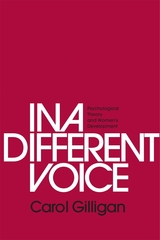
This is the little book that started a revolution, making women’s voices heard, in their own right and with their own integrity, for virtually the first time in social scientific theorizing about women. Its impact was immediate and continues to this day, in the academic world and beyond. Translated into sixteen languages, with more than 700,000 copies sold around the world, In a Different Voice has inspired new research, new educational initiatives, and political debate—and helped many women and men to see themselves and each other in a different light.
Carol Gilligan believes that psychology has persistently and systematically misunderstood women—their motives, their moral commitments, the course of their psychological growth, and their special view of what is important in life. Here she sets out to correct psychology’s misperceptions and refocus its view of female personality. The result is truly a tour de force, which may well reshape much of what psychology now has to say about female experience.

Poorman brings together ethics and pastoral practice in an interactional model that captures the distinctive character of Christian pastoral counseling. His work is especially important in a culture that often confuses pastoral counseling with therapy. It also challenges traditional notions which portray the pastoral minister as an instructor who dispenses the church's moral teaching. Poorman distinguishes the pastoral task from that of therapist or teacher, while drawing on the best resources of contemporary psychology and moral development theories. he brings moral theology into lively conversation with pastoral experience; at the same time, his clear presentation brings a critical method of moral discernment to Christian ministry which is rooted in faith and the wisdom of the community.

READERS
Browse our collection.
PUBLISHERS
See BiblioVault's publisher services.
STUDENT SERVICES
Files for college accessibility offices.
UChicago Accessibility Resources
home | accessibility | search | about | contact us
BiblioVault ® 2001 - 2024
The University of Chicago Press









